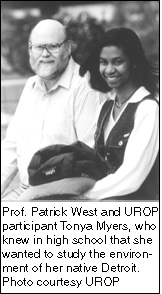The University Record, June 10, 1998
UROP celebrates 10th anniversary this year
By James Matthew Wilson
News and Information Services
 Third-year student Tonya Myers knew in high school that she wanted to study the environment of her native Detroit. In her first year at the University, she signed up for the Undergraduate Research Opportunity Program (UROP) and began working with Prof. Patrick West in the School of Natural Resources and Environment.
Third-year student Tonya Myers knew in high school that she wanted to study the environment of her native Detroit. In her first year at the University, she signed up for the Undergraduate Research Opportunity Program (UROP) and began working with Prof. Patrick West in the School of Natural Resources and Environment.
They studied a particular nutritional problem among the largely African American population in Detroit’s Rosa Parks district, where many residents rely on fish caught in the Detroit River for part of their diet. The river’s pollution, transmitted to residents through the fish, caused negative health effects. West and Myers sought to develop diet alternatives to wean residents away from the fish, including a community garden and farmers market. Such proposals are under way, thanks to Myers and West’s partnership with Detroit-area churches.
“UROP is a chance to involve students early on in their career at the University in the Socratic process of intensive one-on-one learning,” West says. He learned through his work with Myers that “it’s also a high-quality investment of time by the researcher, allowing more study and work to get done.”
Such faculty acclaim, coupled with outside financial support and proven effectiveness, are indicators that UROP continues to make the vast amount of research undertaken at the U-M a daily part of undergraduate education.
UROP celebrates its 10th anniversary this year with a new program to include even more undergraduates in a first-hand research experience. While more than 800 first- and second-year students participated last year, upperclass students were admitted for the first time.
“We expanded because we wanted to meet growing student and faculty demand and interest in establishing research partnerships,” says Sandra Gregerman, program director of undergraduate education in LS&A. A study of the program’s effectiveness, conducted several years ago, showed that UROP significantly improved retention and academic achievement of diverse students.
Other opportunities exist for students to forge research alliances with faculty, notes Lincoln Faller, LS&A associate dean for undergraduate education. He estimates that more than 2,000 undergraduates participate in such partnerships each year.
UROP establishes a formal relationship between the student and a faculty member, and also with research peers who discusses individual projects, hears guest lecturers, and hold skills workshops to practice research techniques.
First- and second-year students earn compensation for their work either by academic credit or work-study as part of their financial aid package.
More than 91 percent of faculty involved in the program say they would participate again, and 97.5 percent say they encourage students to join. The Federal government, private foundations and companies have applauded UROP as well. The U.S. Department of Education’s Fund for the Improvement of Postsecondary Education gave UROP funding to conduct a longitudinal evaluation of the program’s effectiveness in improving student retention. Funding from the Coca-Cola Foundation allows UROP to give awards to faculty mentors and to support students. Funds from the W.K. Kellogg Foundation permits more opportunities for students to conduct community-based research by covering transportation costs and, this summer, to provide 10 fellowships for students to conduct community-based research for 12 weeks. Private companies, including Motorola and DuPont, also have awarded funds to UROP, and the National Science Foundation gave UROP its Recognition Award for Integrating Research and Education. Representatives from colleges and universities across the country have observed the U-M program, and Gregerman often is asked to speak at conferences highlighting undergraduate education.
As a result of her UROP experience, Myers continues to work as an activist in various nutrition-related community projects in Detroit. A junior in the Honors Program majoring in political science, she plans to write her thesis on community organization, drawing from her own experience as a student and activist. Her work this summer is supported by the Kellogg Foundation grant.
Tania Ionin, senior in linguistics from Mount Pleasant, used UROP funding to continue her research analyzing the nature of second language acquisition by Russian-English speaking children. Funding helps cover her travel expenses to interview children in their southeastern Michigan homes, as well as the costs of printing and photocopying her interview transcripts.
This research experience made a substantial difference in Ionin’s undergraduate career, she said. “UROP allows undergraduates to engage in an experience that’s usually reserved for graduate students and faculty. Working on my linguistics project has shown me that I am capable of independent research and original thought, as opposed to just processing information that someone else found.”

